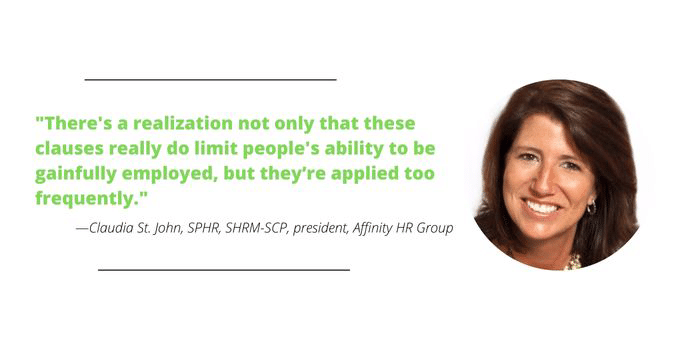The Federal Trade Commission has proposed a new rule that would ban employers from imposing noncompete clauses on their workers. The FTC is currently seeking public comment on the clauses, which are contractual terms between an employer and an employee that blocks the employee from working for a competing employer or starting a competing business, typically within a certain geographic area and period of time after the worker’s employment ends.
PPAI Media spoke with Claudia St. John, SPHR, SHRM-SCP, president of Affinity HR Group, PPAI’s affiliated human resources partner, on the issue. The conversation provides a deep dive into noncompete clauses, how the FTC’s proposed rule might affect businesses and what business owners in the promotional products industry can do if the rule comes to pass.
PPAI Media: Are noncomplete clauses a new idea? Or have they been part of businesses toolkits for a while now?
Claudia St. John, SPHR, SHRM-SCP: Oh, they’re a very old idea. They actually go back to common law and they have evolved over time and as a result of that evolution, the courts have decided on them. It really goes back to like the antitrust and robber baron days where they would put these covenants on employees in order to restrict competition. And so there’s a lot of court law on the subject, and the courts have defined a lot of its history to date.
PPAI Media: How are noncompete clauses usually applied?
St. John: Until relatively recently, a noncompete agreement has had to be very clearly defined. You can’t keep somebody from gainful employment with these covenants, so they have to have some restrictions. It has to have a term limit – usually between six months and two years – and there’s usually a definition of scope and also the geographic footprint.
So, for example, if I was working in a soap manufacturer, you can’t say I can’t work for any manufacturer. Maybe I can’t work for a competing soap manufacturer, but I could go and work for a cosmetics manufacturer.
You’ve restricted me so the courts have really clarified that you need to be much more clear and fair in placing those restrictions. And you have to give people consideration, which means if you’re going to restrict me from gainful employment in my field, you need to pay me. But over time people have said what the consideration is your commission, or the consideration is your pay, or the consideration is offering you employment in the first place.
Also, noncompete clauses are enforced by state law. So, you could have a noncompete for your company’s employees in New York and a completely different one for your employees in Michigan. It’s a mishmash.
PPAI Media: Has the perception of the use of noncompete clauses in business changed? And if so, what’s driving that change?
St. John: What’s happened recently is that there’s a realization not only that these clauses really do limit people’s ability to be gainfully employed, but they’re applied too frequently. They’ve been extended to people are not C-suite or sales or intellectual capital employees. So, the backlash of that is behind why we’re looking at this again.
Several states, including California, Nevada and Oklahoma, have restricted them. They have almost a near ban on them already. Washington state, Colorado, Illinois and Arizona have basically voided them for anybody at a lower compensation level and have put in a lot of covenants. So, you see this path already being walked at the state level.

PPAI Media: What effect would an FTC prohibition on noncompete clauses have on businesses?
St. John: I have heard from a lot of employers who are really not happy about this because they worry that their salespeople or that their staff are going to take their intellectual knowledge. They’re worried that they’re training people to be amazing employees and then they’re going to go and give that training to their competitor. So, there’s a lot of fear around it.
Which I don’t know is entirely justified. Whatever the FTC has right now, it’s not going be what happens in the end. This is going to not only be modified by what we hear in the public comment period, but definitely subject to court decision as to whether or not the FTC even has the authority to issue this rule.
PPAI Media: If a rule prohibiting or restricting noncomplete clauses goes into effect, what can businesses do to protect themselves?
St. John: A noncompete restricts an employee’s ability to work. But there are substitutes that I think employers rightly should and could use. These include agreements on the confidentiality of or nondisclosure of information. In the promotional products industry, for example, that can be pricing or the ‘secret sauce’ that goes into your customer list. There are also non-solicitation agreements that mean I won’t go and try to steal your businesses to follow me to my new business.
And I don’t think the FTC rules are looking to preclude those. Instead of restricting employees’ right to make decisions about where and when they work, I think employers should be saying, ‘I want to be crystal clear, this is information that you can’t share. Confidential information, information that is not publicly available in any way whatsoever outside of these four walls, then you can’t take that with you.’ That’s a reasonable covenant to put on somebody.
I don’t think any rule by the FTC would diminish that. They want to protect a worker’s right to have choice and employment. They don’t want to give a worker the right to destroy a business. That’s not the goal.
I think that nondisclosure and non-solicitation of existing businesses will probably continue to be valid covenants.
PPAI Media: So, it’s possible that the most significant thing to come out of the FTC’s proposal is a reconsideration of how noncompete clauses are applied?
St. John: Right. It’s right-sizing a little bit. I think it’s forcing businesses to say, are these covenants really fair to put on hourly workers. I see a lot of businesses that have absolutely non-enforceable noncompete loss. Draconian ones. And it scares employees. And that’s the point of them. The fact is, those covenants are unenforceable. They just know that those employees are probably unlikely to hire an attorney to fight them in court over it.
If we look at politics right now, Republicans and Democrats agree on nothing. But they want this. I mean, look at the country – the states that have restricted noncompete clauses altogether include both California and Oklahoma! McDonald’s should not be allowed to limit a McDonald’s employee’s right to work for Burger King across the street.
And with the laws governing noncompete clauses varying state by state, I think another takeaway for employers should be, first of all, to take a look at those noncompetes just to make sure they’re compliant with what already exists in all of the different states. And then read the tea leaves and try to get ahead of it and make sure that you’re not overusing them in a way to that restricts employees unnecessarily.
PPAI Media: How might these changes impact businesses in the promo industry?
St. John: For your members, it’s mostly going to show up in relation to their salespeople. There are trade secrets, like, maybe pricing and commission levels. And there are also amazing, high-producing salespeople and businesses don’t want to lose them. Covenants may be in place to keep them from going to a competitor.
But what they’re trying to restrict is the ability for somebody to steal their amazing salesperson, not a trade secret. I would encourage promo employers to look at nondisclosure and non-solicitation agreements. And to make sure their folks are happy. That will keep them there; a happy employee is a stable employee.
People don’t quit their jobs, they quit their bosses. And blocking them in with a noncompete isn’t going to make them more productive or happier or a better employee for that matter.


